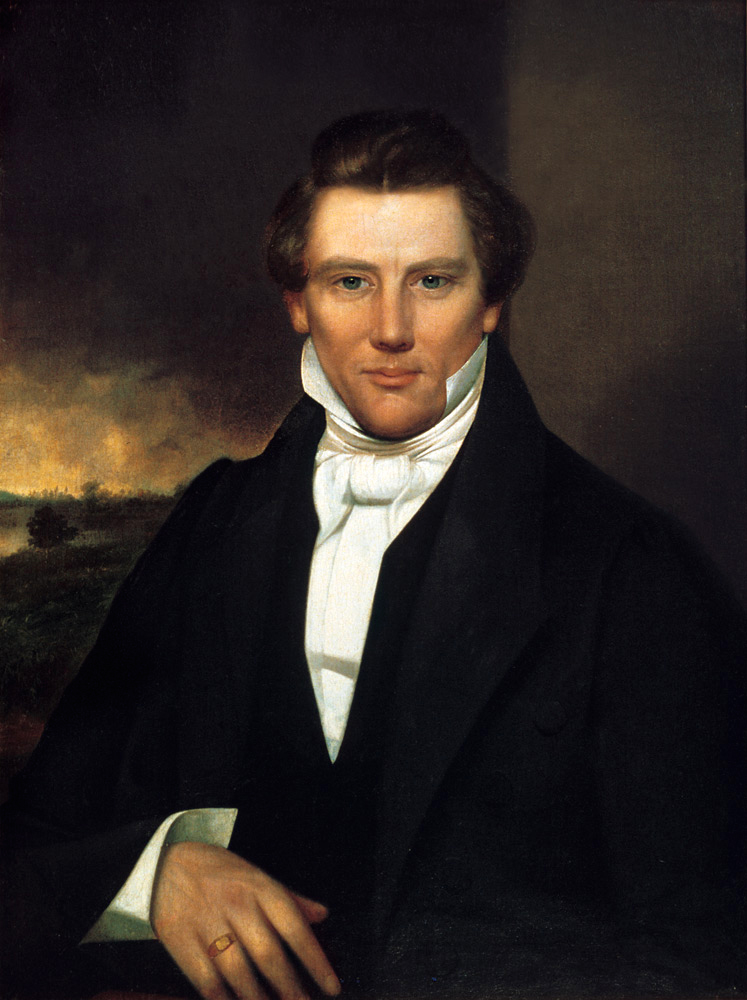History of the Church, 6:306 (7 April 1844)
1840s, King Follett discourse (1844)
Context: You have to learn how to be Gods yourselves, and be kings and priests to God, the same as all Gods have done before you, namely by going from one small degree to another, and from a small capacity to a great one: from grace to grace FROM EXALTATION TO EXALTATION until you ATTAIN THE RESURRECTION OF THE DEAD.
Works
History of the Church
Joseph Smith, Jr.Teachings of the Prophet Joseph Smith
Joseph Smith, Jr.Doctrine and Covenants
Joseph Smith, Jr.Famous Joseph Smith, Jr. Quotes
History of the Church, 5:336 (6 April 1843)
1840s
History of the Church, 5:181 (29 October 1842)
1840s
“Doctrine and Covenants, 135:4 (22 June 1844)”
Smith's comments upon deciding to go to Carthage for incarceration and to face legal prosecution.
1840s
History of the Church, 5:362 (16 April 1843)
1840s
Joseph Smith, Jr. Quotes about God
History of the Church, 6:303-04 (7 April 1844)
1840s, King Follett discourse (1844)
History of the Church, 4:540 (1 March 1842)
1840s
Doctrine and Covenants, 135:1 (27 June 1844)
Cried out by Smith as he fell to his death after being shot by a mob.
1840s
History of the Church, 3:381 (27 June 1839)
1830s
Teachings of the Prophet Joseph Smith, 137 (25 March 1839)
1830s
Joseph Smith, Jr. Quotes about the truth
History of the Church, 6:474-76 (7 April 1844)
1840s, King Follett discourse (1844)
Discourses of the Prophet Joseph Smith, p. 199 (9 July 1843)
1840s
Teachings of the Prophet Joseph Smith, 392 (27 June 1844)
1840s
History of the Church, 5:517 (23 July 1843)
1840s
Joseph Smith, Jr. Quotes
“You don't know me; you never knew my heart. No man knows my history.”
History of the Church 6:317 (7 April 1844)
1840s, King Follett discourse (1844)
Context: You don't know me; you never knew my heart. No man knows my history. I cannot tell it: I shall never undertake it. I don't blame any one for not believing my history. If I had not experienced what I have, I could not have believed it myself.... When I am called by the trump of the archangel and weighed in the balance, you will all know me then.
Teachings of the Prophet Joseph Smith, 160 (2 July 1839)
1830s
Context: Salvation cannot come without revelation; it is in vain for anyone to minister without it. No man is a minister of Jesus Christ without being a Prophet. No man can be a minister of Jesus Christ except he has the testimony of Jesus; and this is the spirit of prophecy.
“That which is wrong under one circumstance, may be, and often is, right under another.”
Teachings of the Prophet Joseph Smith, 256 (11 April 1842)
1840s
Context: That which is wrong under one circumstance, may be, and often is, right under another. God said, 'Thou shalt not kill'; at another time He said, 'Thou shalt utterly destroy.' This is the principle on which the government of heaven is conducted— by revelation adapted to the circumstances in which the children of the kingdom are placed. Whatever God requires is right, no matter what it is, although we may not see the reason thereof till long after the events transpire.
History of the Church, 5:23–24 (9 June 1842)
1840s
Teachings of the Prophet Joseph Smith, 121 (8 May 1838)
1830s
History of the Church, 6:408 (26 May 1844)
1840s
History of the Church, 6:308-309 (7 April 1844)
1840s, King Follett discourse (1844)
“A man is saved no faster than he gets knowledge.”
History of the Church, 4:588 (10 April 1842)
1840s
History of the Church, 4:445 (7 November 1841)
1840s
Doctrine and Covenants, 121:39 (20 March 1839)
1830s
Teachings of the Prophet Joseph Smith, 257 (11 April 1842)
1840s
1840s, King Follett discourse (1844)
“I teach the people correct principles and they govern themselves.”
Quoted by John Taylor, Journal of Discourses, 10:57-58 (18 May 1862)
When asked how he governed his followers in Nauvoo, Illinois.
Attributed to Joseph Smith, Jr.
Doctrine and Covenants, 131:7-8 (17 May 1843)
1840s
“Whenever I see a pretty woman, I have to pray for grace.”
Quoted by Wilhelm Wyl, Joseph Smith, the Prophet, His Family and His Friends (Salt Lake City: Tribune Printing and Publishing, 1886), 55
Attributed to Joseph Smith, Jr.
“If my life is of no value to my friends it is of none to myself.”
History of the Church, 6:549 (22 June 1844)
Smith's reply when friends accused him of cowardice for intending to leave Illinois to avoid legal prosecution.
1840s
History of the Church, 5:517 (23 July 1843)
1840s
History of the Church, 5:362 (16 April 1843)
1840s
History of the Church, 5:517 (23 July 1843)
1840s
History of the Church, 4:461 (28 November 1841)
1840s
Context: I told the brethren that the Book of Mormon was the most correct of any book on earth, and the keystone of our religion, and a man would get nearer to God by abiding by its precepts, than by any other book.
Quoted by Orson F. Whtiney, Life of Heber C. Kimball (Salt Lake City: Kimball Family, 1888), 322
Attributed to Joseph Smith, Jr.
History of the Church, 6:184-85 (21 January 1844)
1840s
History of the Church, 6:476 (7 April 1844)
1840s, King Follett discourse (1844)
